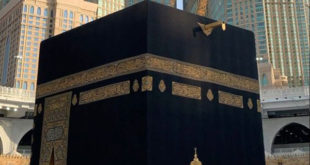1. Say the takbeer, and without raising your hands, proceed into sajdah.[1] 2. Ensure that your back is straight when going down into sajdah.[2] 3. Keep the hands on the knees while proceeding into sajdah.[3] 4. First place the knees on the ground, then the palms, then the nose and …
Read More »Recent Posts
February, 2012
-
20 February
Ruku and Qaumah
1. When you have completed the recitation of Surah Faatihah and the qiraat, repeat the takbeer, and without raising your hands, go into ruku.[1] Note: The takbeeraat-e-intiqaaliyyah (takbeer which is recited when moving from one posture to another) should be commenced as soon as one begins moving to the next …
Read More » -
20 February
Qiyaam
1. When intending to perform salaah, stand and face the qiblah.[1] 2. Thereafter, make the intention of the salaah that you are performing and raise your hands until your thumbs are in line with the earlobes.[2] 3. When standing for salaah, stand with utmost respect. Face both feet towards the …
Read More »
January, 2012
-
30 January
The Faraa’idh and Sunan of Janaazah Salaah
There are Two Faraa’idh in Janaazah Salaah: To recite all the four Takbeers. To stand and perform the Janaazah Salaah if one is able.[1] There are Three Sunnats in Janaazah Salaah: To read the Thana i.e. to praise Allah Ta’ala. To send salutations upon Rasulullah (sallallahu alaihi wasallam). To …
Read More » -
29 January
The Janaazah Salaah
The religion of Islam advocates and commands that one fulfil the obligations he owes to Allah Ta’ala and the obligations he owes to the servants of Allah Ta’ala. Regarding the obligations and rights one owes the servants of Allah Ta’ala, these can be divided into two types of rights. The …
Read More »
-
Tafseer of Surah Naazi’aat
وَ النّٰزِعٰتِ غَرۡقًا ۙ﴿۱﴾ وَّ النّٰشِطٰتِ نَشۡطًا ۙ﴿۲﴾ وَّ السّٰبِحٰتِ سَبۡحًا ۙ﴿۳﴾ فَالسّٰبِقٰتِ سَبۡقًا ۙ﴿۴﴾ …
Read More » -
The Extreme Generosity of Hazrat Talhah (radhiyallahu ‘anhu)
-
Securing the Blessings of Ramadhaan, Umrah and Hajj – The Tolerance of Rasulullah (sallallahu ‘alaihi wasallam) – The Orchards of Love – Part Seventy Three
-
Receiving the title of Al-Fayyadh from Rasulullah (sallallahu ‘alaihi wasallam)
-
Hazrat Talhah (radhiyallahu ‘anhu) Fulfilling his Pledge
-
Receiving Seventy Rewards
Hazrat Abdullah bin Amr bin Aas (radhiyallahu ‘anhuma) reported, “Whoever sends salutations upon Nabi (sallallahu ‘alaihi wasallam) once, Allah Ta‘ala and His angels will send seventy mercies and blessings upon him in return of his one Durood. Hence, whoever wishes to increase his Durood should increase it, and whoever wishes to decrease his Durood should decrease it (i.e. if he wants to earn great rewards, then he should increase his Durood).”
Read More » -
Increase in Sustenance
-
The Reward of Fasting on the Day of Arafah
-
The Angel that Stands at the Blessed Grave of Hazrat Rasulullah (sallallahu ‘alaihi wasallam) to Convey the Durood of the Ummah
-
Reciting Durood when Entering the Musjid
-
Sunnats and Aadaab of the Host – 2
2. Entertaining and hosting guests is a means of attaining great barakah (blessings) from Allah …
Read More » -
Sunnats and Aadaab of the Host – 1
-
Sunnats and Aadaab which every person needs to adhere to in his individual life – 9
-
Sunnats and Aadaab which every person needs to adhere to in his individual life – 8
-
Sunnats and Aadaab which every person needs to adhere to in his individual life – 7
-
Hazrat Ali (radhiyallahu ‘anhu) – Part Forty-One – Being Sent by Rasulullah (sallallahu ‘alaihi wasallam) to Level the Graves, Destroy Idols and Erase Pictures
Hazrat Ali (radhiyallahu ‘anhu) reports that on one occasion, Rasulullah (sallallahu ‘alaihi wasallam) attended a …
Read More » -
Rasulullah (sallallahu ‘alaihi wasallam) Approving of the Verdict of Hazrat Ali (radhiyallahu ‘anhu) – Part Forty
-
The True Ulamaa – Hazrat Ali (radhiyallahu ‘anhu) – Part Thirty Nine
-
Du‘aa for Assistance in Settling Debts – Hazrat Ali (radhiyallahu ‘anhu) – Part Thirty Eight
-
The Concern of Hazrat Ali (radhiyallahu ‘anhu) regarding Business being Conducted According to the Islamic Principles – Part Thirty Seven
 Ihyaaud Deen An Effort to Revive Deen in Totality
Ihyaaud Deen An Effort to Revive Deen in Totality



















































































